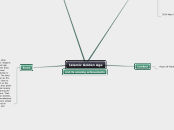Alissar Arnaout
The Age of Enlightenment
Trends of the Enlightenment
"Natural Religion"
Deism
"My own mind is my own church" - Paine
God created universe & let it run
God didn't participate directly in human affairs
Irrational to imagine a world without God
Rejection of traditional religion
Simplification of religious ritual
Le Cafe
Less private
Intellectuals could discuss ideas over coffee
Didn't need invitation (anyone can go)
Salons "Living room"
Class & religion was less important
Men & women were almost equal
Gave sheltered outlet to say views
Intellectuals gathered to present and exchange ideas
Literacy & Knowledge
Books & book production
Writers & intellectuals presented & exchanged ideas
The Encyclopedia
(1751)
Summarized advances in biology, chemistry, medicine & engineering
Subjects:
Government, social system & religion
Editors & contributors:
Jean d'Alembert, Diderot, Montesqueiu, Voltaire, Rousseau, etc.
- Movable type → many copies
- Newspapers → Gazettes
Government advisors → literate population was an advantage
More readers & writers
Spread of ideas of thinkers
Enlightenment Thinkers / Philosophes
Adam Smith
Economic
- proponent of free trade
- against mercantile system
- greater & more competitive trade
- "Invisible hand of competition"
- Capitalist economy
Montesquieu
- Laws & customs → products of society's condition
- pondered effects of climate, social & sexual customs
- Nature of things → consequence of politics
- monarchy was the best government
Rousseau
- Didn't accept Enlightenment
- looked down on luxury → French life was artificial
- "State of Nature"
- innocence of children & corruption of society
Political authority → "general will" & "common good"
Voltaire
- defended tolerance
- attacked religious piety
- criticized severity of punishment
- èrasez l'infâme → crush infamy
John Locke
Social
- defended rights to own property → essential to well-ordered society
- leaving "state of nature" → enter well-ordered society
Political
- Defended need for elected governments
- uphold freedom & tolerance
- government looked after people
- people had right to overthrow government & elect leaders
Government & Nobility
Government
Monarchies
constrained by tradition, religion & obedience to legal precedents
Rulers
- could be children
- sick
- insane
Royal court
nobles fought for position with eye on the heir to the throne
full of personal intrigue & scandal
nobility get power & rewards
- Attention to military strength
- Not much attention to public opinion
Nobility
Weakening of nobility
18th century → social authority of nobility weakened
Leaders & court were unhappy with greed and demand for protection of privileges
Saw themselves as superior
Collected rent from peasant farmers or had them work for wages
Collected taxes from peasants/farmers/labourers
Demanded obedience from those who worked on their property
Enjoyed profits from crops & other products of the land
Industrial Revolution
Gradual series of changes in agriculture, trade & industry
Rise of the merchant class
Consumerism
Money increased → new middle/ merchant class
Joint-stock companies increased volume of trade
Spread of capitalism
Rural economy was the root of national wealth
Technology
- spinning jenny
- water-powered frame
- flying shuttle
Increased production
Created consumerism
What is the Enlightenment?
Cogito Ergo Sum
Old idea: absolute monarch
New idea: government rules because of people
criticizing absolutism and new ideas about government
New ideas in areas outside science
"I think therefore I am"
Believed
freedom of thought; criticized unquestioned obedience
everything could be explained by natural laws
universe is understood through reason
Population Growth
Population explosion
Politically discontented
Socially disadvantaged
Rise in population → demands for food, jobs, goods and services
Increased & improved food supply → agricultural production
Decline in number of deaths due to:
Fewer wars, epidemics and improved hygiene & sanitation
Land & Agriculture
Advantage/gain
Aimed to produce surplus to be sold on open market
commercialized
Radical change in land distribution
Enclosure: landlords consolidate land as their own
Range of productivity on farms
- Aristocrats
- resident farmers
- peasants
- labourers
Agricultural Revolution
Developments/inventions in methods of agricultural production
seed drill → improved planting
steel plow → turned over soil
Natural fertilizers and rotation of crops









